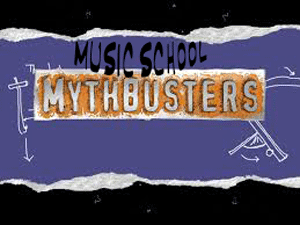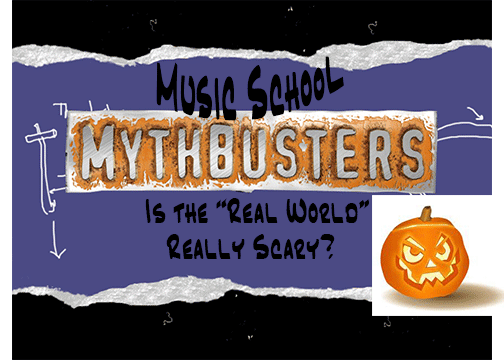Music School Mythbusters: Is the “Real World” Really Scary?
The Myth
Over the past four weeks, the various “myths” addressed in this series have made at least one thing clear: the time we spend in music school is an indisputably taxing period. But the stress of lessons, performances, and academics pale in comparison to the prospect of facing life after music school: the so-called “real” world. Throughout the course of our advanced education, it’s often impressed upon us that life as a professional musician is fraught with hazards. Stories of disillusioned graduates, volatile orchestral managements, and shrinking employment opportunities are rarely absent from the conservatory gossip chain, painting a picture of early professional life as a difficult and disparaging reality. But is it actually that bad? Or is this yet another myth perpetuated by a sampling of anomalies? In honor of today’s designation as the scariest of the year, we’re going to dedicate this final edition of “Music School Mythbusters” to answering what is possibly the most uncomfortable question we ask ourselves in music school: is the “real world” really scary?
The Argument for the Myth
I think it’s fair to say that most musicians aren’t in it for the money; the reality of the job scene is common knowledge even amongst the most naive conservatory freshmen. It’s even found its way into the butt of our jokes (Q: “What did the composition major say when he got his first real job?” A: “Do you want some fries with that?”). But as much as we may chortle about having to live in a box post-graduation, the relevant statistics are no laughing matter. Perhaps this is why Ray Ricker, longtime Eastman professor and Polyphonic’s Editor-in-Chief, begins his acclaimed book, “Lessons from a Street-Wise Professor,” with the following run-down:
“It is difficult to compare apples to apples when collecting music student statistics, but here are some numbers to help put things in perspective. There are more than 1,800 degree-granting music schools, departments and conservatories, and 42,000 music faculty in the U.S. and Canada. The National Association of Schools of Music is the accrediting organization for higher-education music schools. It has approximately 625 institutional members, or about one-third of the total number of music programs…. In the latest information that is available, they report that in the fall semester of 2009 there were 115,147 music majors of all degrees, both graduate and undergraduate, enrolled in U.S. Music Schools….but remember, these are figures from only the 625 schools on the member books of NASM. According to the College Music Society, a much more inclusive organization, there were 326,975 students enrolled in music programs from 2007 to 2008. These statistics include all majors and degrees….but no matter how you look at it, there’s a lot of mouths to feed” (Ricker xii-xiii).
After acknowledging that orchestra musicians are “a small sub-set” of the staggering 326,975 figure, Ricker goes on to note that only 150 orchestra jobs open up in the top 50 American orchestras each year. This might not be as condemning a number if you’re a music education major, but for the thousands of performance majors slaving away on their excerpts, it’s a deeply unsettling one. (I should clarify here that Ricker takes care to discourage readers from being despondent upon reviewing these statistics, and goes on to make an excellent case for entrepreneurial musicianship. For the purposes of the “devil’s advocate” argument being explored here, however, let us just consider the numbers sans interpretation for the moment.) The resulting sense of helplessness is only further underlined when you are a frequent recipient of the lecture that an orchestra job is your best shot at securing a stable income. Indeed, in my first orchestral repertoire class as an undergraduate, the professor began by stating (with a deeply serious countenance) that the three employment options we had as aspiring cellists were to become a soloist, chamber musician, or orchestra musician.
“And it’s very rare that you’ll make it as a soloist or a chamber musician,” he told us admonishingly, looking slowly around the room. “So the work you do in this class might very well be the most important work you do at the conservatory.”
Needless to say, I left that class feeling quite unnerved.
This real-life musical horror movie only gets worse when we learn that even graduates from the best colleges and most competitive conservatories aren’t faring much better than everyone else. This reality is perhaps best illustrated in a famous New York Times article entitled, “The Juilliard Effect: Ten Years Later” which was published in 2004 but still receives a fair amount of circulation amongst those claiming that the death knell has sounded for classical music. Having tracked down 36 of the 44 instrumentalists that comprised of the Juilliard class of 1994, the author discovered that “at least 12 are out of professional music performance. Eleven have full-time orchestra jobs….Four are freelancers who survive by teaching; five more consider themselves full-time freelancers or chamber musicians; three consider themselves mainly soloists.” If we are to assume, as the author does, that the eight individuals who could not be traced do not have a significant music career, we are confronted with the alarming statistic that nearly half of the Juilliard class of ’94 were not successful as musicians. And this is the school that has a 7% acceptance rate to begin with.
So, to recap, we have:
- Thousands of performance majors dead-set on obtaining an orchestra job;
- Less open orchestra spots than the number of people you can fit into your house for a Halloween party;
- Half of Juilliard graduates switching fields.
Want to tell a scary story tonight? Just read the above. And then consider majoring in Biology.
The Argument Against the Myth
Haha, just kidding. I hope that got your heart rate up a bit, though–it wouldn’t be Halloween if I couldn’t scare my readers with dire statistics about the reality of being a classical musician. But it’s actually not the reality at all. In spite of what seem to be insurmountable odds, thousands of performance majors are graduating each year and of the ones I know (and I know a lot), 0% are living in boxes and most of them are still musicians!
How is this possible?? Well, for starters, you have to consider that while the “top” orchestras in the country have admittedly few openings annually, there are a myriad of groups that, while not necessarily guaranteeing health insurance, employ musicians regularly. In fact, many of these “minor league” orchestras, if you will, don’t even require auditions. There’s no shame in freelancing, and (most of the time) it represents a source of much-needed supplementary income. Secondly, there is one major money-making option that, while apparently overlooked by my beloved orchestra rep. teacher, represents a golden opportunity for musicians of all calibers: teaching! Even if you’re not planning to go the whole nine yards and teach at a college, you’ll certainly be able to attract students if you market yourself and possess at least some degree of expertise. My brother, who’s only a junior in high school, teaches every weekend, and he wants to be a meteorologist. Heck, I wouldn’t even be surprised if some meteorologists teach on the weekends! The point is, it’s a viable and rewarding option, and definitely one that many musicians take advantage of.
And that’s just the tip of the iceberg. The “orchestra job or nothing” mentality might have been relevant thirty years ago, but times have changed. Our generation lives in the age of innovation; modern technology has given us tools and resources that make it easier than ever to market ourselves and create our own unique product. “Entrepreneurial Musicianship” is the new buzzword at conservatories and universities alike. Sure, there’s thousands of musicians out there, but that doesn’t mean that the competition is fiercer–it means that the number of potential collaborators is greater. We’re better positioned than ever to serve the needs of a rapidly changing culture, and if we allow ourselves to step outside the narrow path of traditionalism, the ways in which we can impact the communities around us are practically endless.
The Conclusion
While there is a ring of truth to the “classical music horror story,” it should not be taken to represent the reality of typical professional life, and should certainly not lead us to believe that the “real world” is a scary place. Looking past outdated mentalities and the cases of select individuals with a relatively narrow career focus, it’s clear that there are plenty of opportunities available for an open-minded aspiring musician. The fear of venturing out into professional life is no different than the fear of a lost trick-or-treater in a darkened alleyway: we are not fearing the present situation, only the unknown of the future. Yes, some unpleasant, even terrible things could happen to us, but that’s no reason to be scared or afraid. I’m no psychologist (really, I get the Ego and the Id mixed up all the time) but it seems fairly clear to me that the best way to overcome a fear is to face it. We should not dread the moment of our entrance into the “real world,” but embrace it with an open mind and a positive attitude, ready to weather whatever storms may come. That is, in a sense, the essence of Halloween: the things that seem scary really aren’t, when you see them for what they really are.
Okay, folks, that’s the series. I hope you’ve enjoyed this month’s editions of “Music School Mythbusters,” and that these posts have proved beneficial in fostering a more realistic understanding of music school and pre-professional life. This series may be over, but I am always open to suggestions, so don’t hesitate to get in touch if you have an idea that you feel might be fitting for this blog. Many thanks–your readership is greatly valued and appreciated.
Missed a previous edition of “Music School Mytbusters”? Catch up here:
Is Playing Politics Necessary?
How Much Online Promotion is Too Much?




